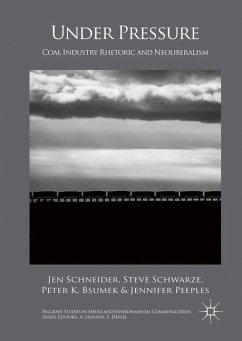This book examines five rhetorical strategies used by the US coal industry to advance its interests in the face of growing economic and environmental pressures: industrial apocalyptic, corporate ventriloquism, technological shell game, hypocrite's trap, and energy utopia. The authors argue that these strategies appeal to and reinforce neoliberalism, a discourse and set of practices that privilege market rationality and individual freedom and responsibility above all else. As the coal industry has become the leading target and leverage point for those seeking more aggressive action to mitigate climate change, their corporate advocacy may foreshadow rhetorical strategies available to other fossil fuel industries as they manage similar economic and cultural shifts. The authors' analysis of coal's corporate advocacy also identifies contradictions and points of vulnerability in the organized resistance to climate action as well as the larger ideological formation of neoliberalism.
"This book is engagingly written. It is the result of a methodical and exhaustive research process and should represent an example of the best practice in scholarly inquiry. As for the content, it could be interesting for European audience, who are stressed not only by economic and environmental worries, but by a looming energy crisis." ( Violeta Stojicic, Language & Ecology, 2023)
"This volume addresses rhetorical strategies employed by the coal industry to resist regulatory efforts by the government and environmental groups. ... This book is of interest not only to environmental communication scholars and students, but also to those studying integrated marketing communication approaches to advertising and public relations. Summing Up: Highly recommended. Upper-division undergraduates through faculty." (J. H. Fritz, Choice, Vol. 54 (5), January, 2017)
"This volume addresses rhetorical strategies employed by the coal industry to resist regulatory efforts by the government and environmental groups. ... This book is of interest not only to environmental communication scholars and students, but also to those studying integrated marketing communication approaches to advertising and public relations. Summing Up: Highly recommended. Upper-division undergraduates through faculty." (J. H. Fritz, Choice, Vol. 54 (5), January, 2017)








